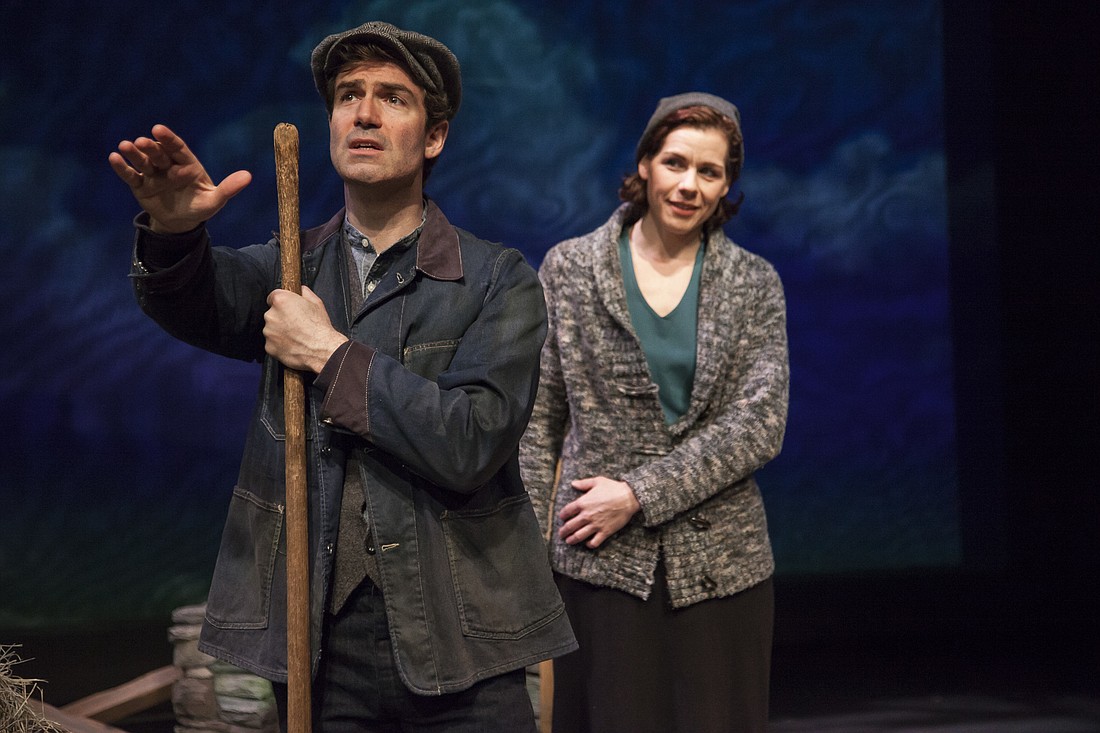- November 23, 2024
-
-
Loading

Loading

John Patrick Shanley’s “Outside Mullingar” is now on stage at Florida Studio Theatre. His tale of land, long memories and the heart’s secrets is set in this century’s rural Ireland. It could easily be another century. As to the tale itself …
Like the scrollwork on the Celtic cross, Shanley’s story seems like a complicated tangle of knots at first. But those knots boil down to simple twists and turns. And they’re all connected. As to the tale itself …
Once upon a time in Ireland, Anthony (Gil Brady) pushed a young girl named Rosemary (Claire Warden) down. Soon after, Anthony’s father, Tony (George Tynan Crowley), suddenly realized that he loved his wife. Tony then sold his farm’s road access to his neighbors to buy her a proper wedding ring. Ah, but little Rosemary was one of Tony’s neighbors—and her father gave her the land he’d bought. Today, Anthony is grown, his mother is gone, and his father’s soon to follow; Rosemary has only her mother, Aoife (Louisa Flaningam), on this earth—but not for long either. Ancient custom dictates that Tony pass the farm on to Anthony. But Tony thinks his hardworking son is a flake and wants to sell the farm to his American nephew instead. Ah, but Tony needs to buy that strip of land first. And Rosemary won’t sell. Out of spite, or some other motive …
Clear as mud, eh? But the story’s knots all untangle and converge. You might suspect Anthony and Rosemary hide an unspoken love for each other. They might. But that’s not the point. (Hold that thought.)
Kate Alexander directs Shanley’s sweet tale with a light, loving touch. And the actors embody their characters without seeming like fugitives from a U-2 video.
Conroy’s Anthony is a dreamer, but not an idiot. (His dry, comic delivery reminds me of Michael Palin.) Warden’s chain-smoking Rosemary keeps her cards close to her chest. She’s not a cliché spinster, not a ball of sexual frustration, not a mad thing, not bitter—but she’s clearly hiding something. Warden makes you believe in the mind behind Rosemary’s sad eyes. Crowley, versatile actor that he is, gives fleshy life to Tony—who could easily have been merely a cranky curmudgeon. Flaningam does the same in Aoife’s brief moments.
These variously incarnated characters do their thing in Gregory A. Poplyk’s costumes (early 21st century workclothes) and Moriah and Isabel Curley Clay’s weirdly specific/unspecific sets. Think bits and pieces of cottages and sheds on wheels—a floating world that takes form before your eyes. Much like Shanley’s improbable happy ending.
Hey, if a happy ending is enough for you, just call this play “The Irish Moonstruck” and skip my analysis. If not, let’s get back to my unspoken question …
What’s the point?
Grace, I think. But not cheap grace.
To pull a literary reference from my sleeve, the characters of James Joyce’s “Dubliners” were stuck. So are the characters of “Outside Mullingar.” But they get unstuck. How?
Somehow their mental prisons are unlocked. And not from the inside.
“Somehow.” What a happy thought. How? By whom?
That would be telling. But Shanley doesn’t tell.
The playwright never reduces grace to a cute slogan that’d play on “Oprah.” Share your feelings. Everything happens for a reason. Sometimes the answer is right in front of you. Forget it. Mysticism on the other hand …
He soaks and steeps and saturates his play with it.
Like a swirl on the Celtic cross, Shanley’s cute dialog and funny/weepy story is part of a much larger pattern. Signs and mystic correspondences hint of that pattern. A missing ring here, a splash of heather there. Deus ex machina? Well …
Deus ex machina is a cheat. Unless you think there’s a Deus above this world, or in it.
Something tells me Shanley isn’t cheating.